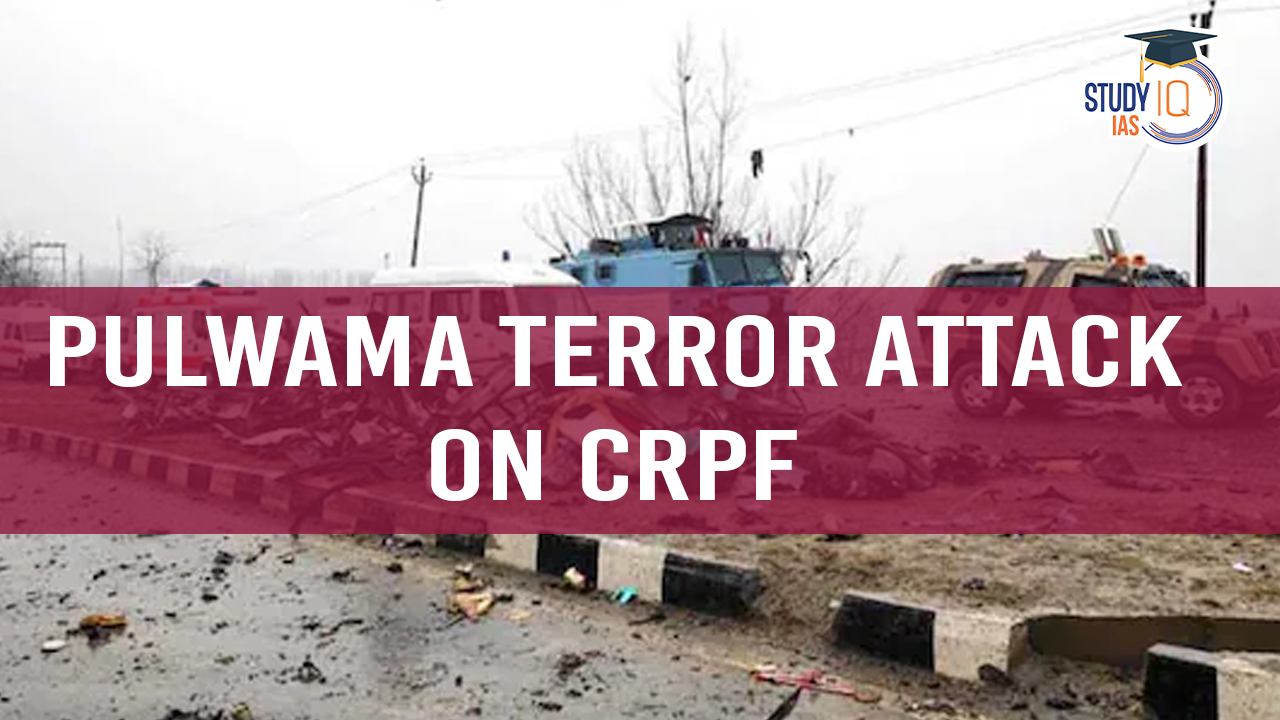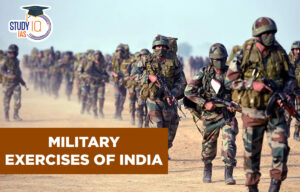Table of Contents
February 14, 2019, was one of India’s worst days in recent times when a deadly terror strike was launched on a convoy of Central Reserve Police Force (CRPF) troops along the Jammu-Srinagar National Highway in Pulwama, Jammu and Kashmir. The attack, which was launched by the Jaish-e-Mohammed (JeM), killed 40 valiant soldiers and injured many others. This sorrowful incident is commemorated every year as a Black Day in India, a reminder of the great sacrifices that India’s armed forces made during the anti-terrorism struggle.
Pulwama Terror Attack on CRPF
On 14 February 2019, a suicide attack in Pulwama, Jammu, and Kashmir, killed 40 CRPF personnel. The Jaish-e-Mohammed-claimed attack was India’s deadliest terror attack. It caused outrage across the country and resulted in the Balakot airstrike, a major episode in India’s war against terrorism.
| Details | |
|---|---|
| Date | February 14, 2019 |
| Location | Pulwama, Jammu and Kashmir |
| Attack Type | Suicide bombing |
| Target | CRPF convoy on the Jammu-Srinagar National Highway |
| Casualties | 40 CRPF personnel killed, over 35 injured |
| Attackers | Jaish-e-Mohammed, a Pakistan-based terrorist group |
| Immediate Response | Nationwide outrage, political, and military mobilization |
| Retaliation | Balakot airstrike on February 26, 2019, targeting terrorist camps in Pakistan |
| Significance | Marks one of the deadliest attacks on Indian security forces |
| Commemoration | Observed annually as ‘Black Day’ to honor the martyrs’ sacrifice |
What Happened on February 14, 2019?
The Pulwama attack was a suicide attack, one of the most horrific and destructive in the nation’s history. The bomb-packed vehicle, operated by local militant Adil Ahmad Dar, was driven into a bus transporting CRPF troops, who were part of a 78-vehicle convoy that was carrying more than 2,500 soldiers. The explosion killed 40 soldiers and injured more than 35 others, some of them critically.
The attack was straight on the security forces, and more so against the CRPF, which is responsible for enforcing law and order in sensitive areas like Jammu and Kashmir. The attackers were said to be associated with Jaish-e-Mohammed, a terror group based in Pakistan, which eventually claimed responsibility for the ghastly act.
Black Day: A Day of Mourning and Tribute
Each year, February 14th is celebrated as a Black Day in India to commemorate the martyred heroes and honor their ultimate sacrifice. National mourning is observed on the day with several events, memorial services, and online tributes being held to salute the lives lost and stand with the families of the soldiers.
The Pulwama attack is an agonizing reminder in the collective memory of millions, a harbinger of cross-border terrorism forever looming over our heads. It is also an indicator of India’s security personnel’s resilience and courage who stay firm in their determination to secure the nation.
India’s Response to the Pulwama Attack
After the attack, India committed to taking severe action against the attackers and those who supported them. The Indian Air Force (IAF) conducted the Balakot airstrike on 26 February 2019 targeting a Jaish-e-Mohammed camp at Balakot in Pakistan, in response to the Pulwama attack. The attack was viewed as an aggressive step taken by the government of India to demonstrate its intent to eradicate terrorism.
The attack also resulted in a major overhaul of India’s security and defense strategies, with a focus on border security, intelligence collection, and counterterrorism operations.
Pulwama Attack – A Symbol of Heroism
The CRPF men who were killed in the attack are not only remembered for their bravery but also their ultimate sacrifice in duty. The trauma of losing 40 courageous soldiers on that fateful day still echoes throughout the country. Their faces and names have become synonymous with selflessness, courage, and patriotism.
How is Pulwama Attack Commemorated?
The 6th anniversary of the Pulwama attack is a day dedicated to remembering the martyrs and commemorating the struggle against terrorism. Different public personalities, like the Prime Minister, Defense Minister, and Union Ministers, lay their tributes to the deceased soldiers.
Key Tributes and Remembrances:
- Prime Minister Narendra Modi pays homage to the martyrs on social media, often saying that the “coming generations will never forget their sacrifice.”
- Amit Shah, the Home Minister, has consistently paid heartfelt tributes to the fallen soldiers, emphasizing the government’s commitment to a “zero tolerance” policy against terrorism.
- Rajnath Singh, the Defense Minister, regularly expresses his deep respect and admiration for the soldiers who sacrificed their lives for India.
Black Day Status and Photos
On the 14th of February, most Indians across the country modify their social networking site statuses and post memorial photos to commemorate Black Day. The posts commonly feature strong photographs of the CRPF personnel, the Indian flag, and words of tribute and solidarity for the martyr families.
Some of the popular Black Day statuses posted across sites such as Facebook, Twitter, and Instagram are:
- “We will never forget the sacrifices made by our heroes on February 14, 2019. Jai Hind!”
- “Pulwama Attack, a day of grief and remembrance. Saluting our brave martyrs.”
- “Remembering the martyrs who gave their lives for the safety of our nation. #BlackDay #PulwamaAttack.”
- “We honor the memory of those who sacrificed everything for our country. #PulwamaAttack #NeverForget.”
The Legacy of Pulwama Attack
The Pulwama attack continues to shape India’s policies, particularly in dealing with terrorism. Over the years, the government has strengthened its counterterrorism measures, deployed more forces in high-risk regions like Jammu and Kashmir, and invested in state-of-the-art surveillance technology to prevent future attacks.
Pulwama is a painful chapter in India’s history, but it also serves as a testament to the resilience of the nation and its determination to fight terrorism.
Conclusion
The Pulwama attack of 2019 will forever be remembered as a Black Day in India’s history. It not only claimed the lives of 40 brave CRPF soldiers but also ignited a fire of patriotism and resolve to fight terrorism. As a nation, we continue to honor their memory, pay our respects, and renew our commitment to protecting the values of peace, unity, and sovereignty. This Black Day serves as a reminder that the fight against terrorism is far from over, and India stands united in this ongoing battle.


 Utkal Divas 2025: Odisha Foundation Day ...
Utkal Divas 2025: Odisha Foundation Day ...
 List of Military Exercises of India 2024...
List of Military Exercises of India 2024...
 GPS Spoofing and Its Impact in India: A ...
GPS Spoofing and Its Impact in India: A ...





















